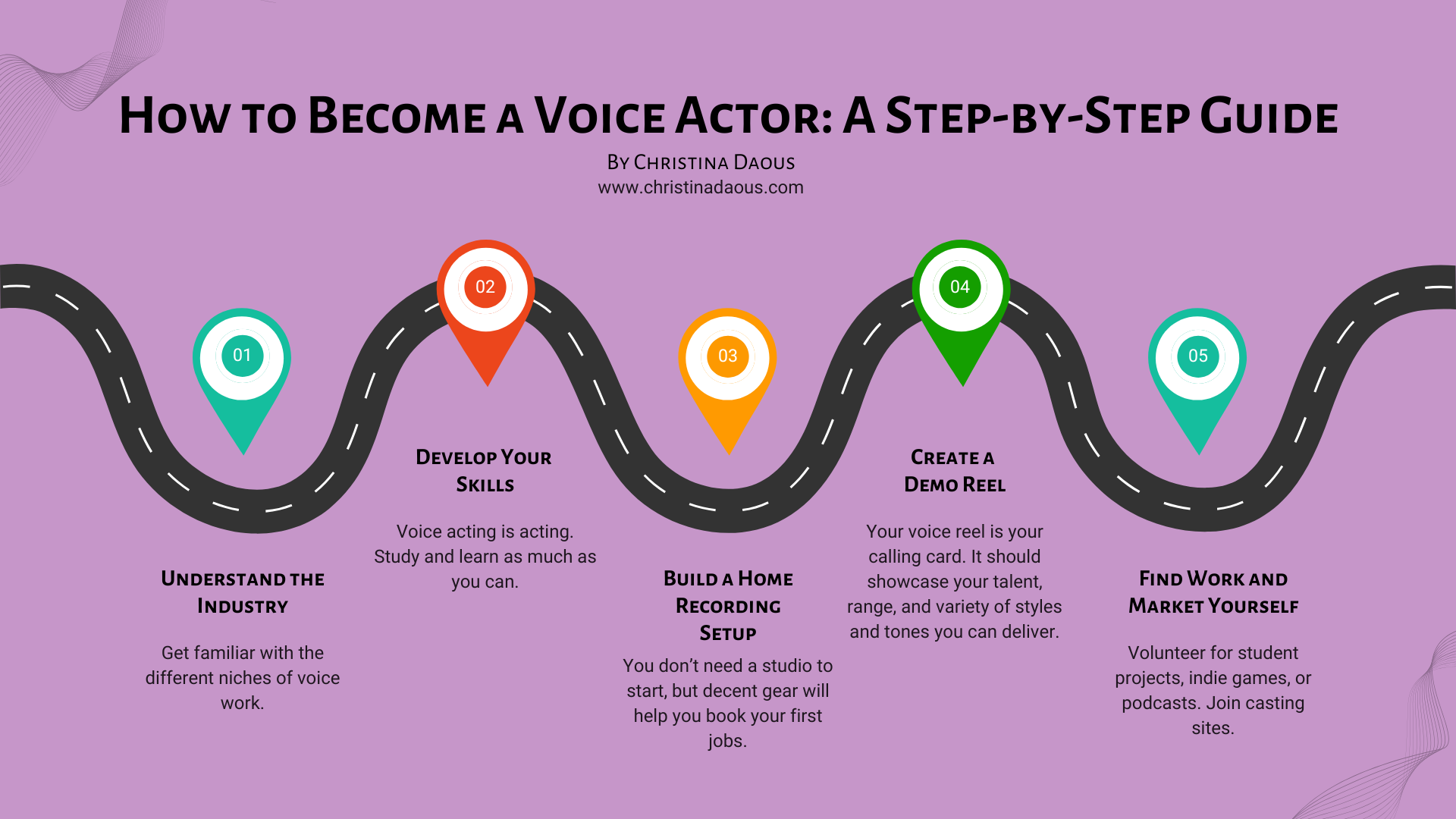Voice acting is a unique blend of performance, vocal technique, and storytelling. Whether you’re inspired by animated characters, dramatic audiobooks, or quirky commercials, being a voice actor can be both a creative outlet and a career path.
Here’s a practical guide to help you get started.
What is Voice Acting?
Voice acting involves using your voice to bring characters, scripts, or concepts to life. This can include:
- Commercials
- Audiobooks
- Animated series and films
- Video games
- E-learning and corporate narration
- Voice assistants and apps
It’s not just about having a “nice voice”—it’s about delivering emotion, timing, and authenticity. Just like with many other careers and jobs, voice acting is a job and it can be considered work. This means that you’ll want to be prepared to do some boring stuff as well. A lot of my days as a voice actor pass by handling the business aspect of things, networking, marketing, (strategic) planning, and paperwork.
Step 1: Understand the Industry
Before jumping in, get familiar with the different niches of voice work:
- Character voice acting (games, cartoons)
- Narration (documentaries, audiobooks)
- Commercials (TV, radio, web)
- Dubbing (foreign films and series)
- IVR and e-learning (corporate or medical narration)
Which of these areas interest you the most? Being a voice actor doesn’t mean you’ll have to focus on one of these areas only, however, it’s quite usual that voice actors do more work in one field than another. It’s crucial to understand that delivering performances is different in each of these areas – it’s different to do 3 minutes of video narration for a company, record an 8-hour audiobook, or dub a character. None of these are better than others, they are simply different. Explore platforms like YouTube, BehindTheVoiceActors.com, or even local TV ads to understand tone, pacing, and delivery styles.
Step 2: Develop Your Skills
Take Acting Classes
Voice acting is acting. Study:
- Scene work
- Improv
- Script interpretation
- Emotion through voice
Acting techniques and methods can help you with coming up with exercises. Here are some names to get you started:
- Konstantin Stanislavski
- Lee Strasberg
- Sanford Meisner
- Uta Hagen
- Michael Chekhov
- Stella Adler
Platforms like Masterclass can help you with getting started easily. There are multiple content creators globally who teach what they know on YouTube as well.
Practice Vocal Technique
- Breath control
- Articulation and diction
- Projection and vocal stamina
Experiment with Voices
Try mimicking characters, changing pitch, or reading stories with different emotional tones. Record yourself and listen. Some actors say that they do not wish to see or hear their own work, and that’s fine too. However, I believe that when you are a beginner and starting on a path to becoming a voice actor, it’s important to understand how do you sound like when you deliver. This can potentially help you when you are in the booth recording and you can catch mistakes immediately while you are doing them. Being aware of your own capabilities and voice helps you and the director and/or sound engineer in bringing out the best in you.
Step 3: Build a Home Recording Setup
You don’t need a studio to start, but decent gear will help you book your first jobs:
- Microphone: Start with a USB mic like the Blue Yeti or upgrade to an XLR mic with an audio interface. I’ve worked with RØDE Microphones and they’ve never let me down.
- Recording software: Audacity (free), Adobe Audition, or Reaper. I personally work with Studio One 7 as I have a Presonus interface.
- Quiet space: Treat your room with blankets or foam to reduce echo and noise. When you’re starting out, a closet, closed room or corner of a room will be just fine.
A lot of work is done remotely and in voice actor’s own home studios. You can start with a smaller and cheaper setup and gradually improve while you’re booking more jobs and gaining more experience.

Step 4: Create a Demo Reel
Your voice reel is your calling card. It should showcase your talent, range, and variety of styles and tones you can deliver. Consider doing a demo reel for all the areas you wish to find work in, such as commercial, e-learning, narration, and/or video games.
Tips:
- Keep it under 90 seconds.
- Showcase a variety of tones and styles, switch up between upbeat and slow.
- Use mock scripts that are tailored to you.
- Don’t add background music unless it enhances the voice.
My personal recommendation is to hire a professional editor to help polish it. There are many professional companies and freelancers to do this work. Listen to their demos and the work they are showcasing and find your favorite and in your price range. If you’re not sure what you are looking for, I always recommend finding a voice artist you like and reach out to them to ask who did their demos. Most voice artists are happy to help you succeed!
Step 5: Find Work and Market Yourself
Start Small
- Volunteer for student projects, indie games, or podcasts.
- Join casting sites: Voices.com, Voice123, Fiverr, BunnyStudio, and Casting Call Club.
Build Your Online Presence
- Website with your bio, demo reel, and contact info.
- Use platforms like LinkedIn, TikTok, or Instagram to share samples and behind-the-scenes content.
It’s completely all right if you wish to stay anonymous and not publish your own face online. You could come up with an avatar, stage name, or a character and display your talent through that.
Step 6: Network and Keep Learning
- Join voice acting Facebook groups or Discord servers.
- Attend workshops and conferences (online or in-person).
- Follow working voice actors on social media to learn about the industry.
Becoming a voice actor is a mix of talent, consistency, and business smarts. Like any craft, it takes time to grow—but with patience, practice, and persistence, you can carve out your niche. It can also help to understand what is your goal when it comes to voice acting – do you want to do it full time, as a hobby or a part-time job to earn more income? Treat it either like a business or a hobby, and it will help you get more clear on how much time you want to invest in it.
Whether you dream of voicing fantasy heroes or narrating science documentaries, your voice might just be your most powerful tool.
—
This text was written with the help of artificial intelligence. It’s my content, but I’ve asked AI to help with grammar and structure.



